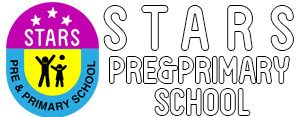About us
Welcome to Stars Schools
At Stars School, we believe learning should be fun, inspiring, and full of discovery. From our youngest learners in Pre-School to our Primary students, we nurture creativity, talents, and confidence — preparing children not just for school, but for life.
OUR MISSION
"Stars Pre & Primary School is dedicated to recognizing and respecting the individuality and unique talents of every child. We foster a caring and creative learning environment, diligently focusing on the holistic social, emotional, physical, and intellectual development required for success in life."
OUR VISION
"Stars Pre & Primary School strives to provide a stimulating and creative learning environment that fosters student talents and emphasizes technological integration across the entire curriculum. Our aim is to maximize individual potential and ensure students of all ability levels are well-equipped to meet the challenges of life, education, and work."
OUR FOCUS
"Where excellence begins early—our students develop critical thinking, creativity, and technological orientation across the whole curriculum. We foster innovation from the earliest ages, preparing learners to thrive in every pursuit and challenge."
Call Now To Enroll Your Child
We offer more than just education; we cultivate future leaders and innovators. We pride ourselves on delivering excellence in the following key areas:
Give us Feedback
